Listening to today's podcast (8/2/11), I found myself talking to my monitor a bit more than is really seemly. In lieu of replaying the podcast a few times to scream at it even more, I've decided to commit a few thoughts to not-paper.
First, three links:
http://wh40k.lexicanum.com/wiki/Main_Page
The first is to the Warhammer 40k lore wiki I prefer. It's a wiki. You shouldn't need more explanation than that.
http://www.games-workshop.com/gws/catalog/landing.jsp?catId=cat440163a&rootCatGameStyle=
The second is online store of Games Workshop (GW,) the company that makes 40k. Good for poking around and looking at the models. Your first thought when visiting that site should probably be "Damn, these are expensive." You're right. They are.
The third is The Black Library, which is GW's publishing wing. Yes, they really do produce enough books to justify having a "Publishing Wing."
The Primer has three sections:
An overview of the three factions that will appear in the upcoming game.
A brief overview of the tabletop game itself.
An exploration of the concept of an "Entry Point," with some book recommendations.
Since the three races announced in the upcoming video game are Space Marines, Orks and Chaos Space Marines, (SM, Orks, and CSM, respectively,) a quick overview of those three factions might be in order.
The Space Marines!
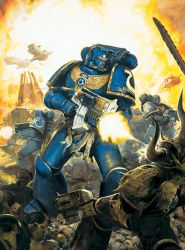
The Space Marines are a force of genetically and biologically enhanced super-human super-soldiers. The Space Marines are divided into forces called "Chapters," each generally having about 1,000 soldiers. The number of chapters is not set, and aside from the "core" chapters, they tend to be pretty vague. This is mostly to allow players of the tabletop game to come up with their own chapter without violating any lore. The "Core" chapters, on the other hand, are very well-defined, each having it's own set of important characters and an overall theme.
An individual Space Marine starts as a human, born on a planet that his chapter watches. These worlds tend to be harsh as hell, in order to assure that the people on it will be tough enough. On some of these homeworlds, the SM are entirely known, and interact with the society directly. On others, the society on the planet is too primitive to really understand what the SM are, so they take on the role of "Gods" who come to recruit to best warriors to fight amongst them in the stars. Young warriors or soldiers are recruited, and implanted with something called a "Gene-Seed" which imprints the Chapter's traits onto them. They also recieve a whole host of new organs and other implants, which serve a massive variety of purposes from poisoning their spit to integrating iron into their bones to removing the need to sleep. Space Marines are effectively immortal: One has never died of old age, though the endless wars they engage in mean very few of them live more than a hundred years anyway. To list a few more quick facts: The armor does come off, they're all eunuchs, and there are no female space marines.
http://wh40k.lexicanum.com/wiki/Creation_of_a_Space_Marine < The Details.
The Chapters each have their own theme. The Ultramarines, the chapter used in the upcoming game, are considered the "Vanilla" chapter, because they represent the most generic form of the Space Marines. They have a vague basis in Ancient Greek imagery, what with the Omega symbol, but even that is applied very lightly. A brief survey of some of the other core chapters and their themes:
Space Wolves - Norse Mythology, Vikings, Wolves.
White Scars - Genghis Kahn, The Mongol Horde, Motorcycles-as-Horses.
Blood Angels - Roman Empire, Holy Roman Empire, Vampires.
Dark Angels - Clandestine Knightly Orders, The Illuminati, Secrets?
Black Templars - The Knights Templar (not very subtle.)
Iron Hands - Machines, Cyborgs, Bionics.
Imperial Fists - Modern Military, Pragmatism over Cultishness, Guns.
Three others probably worth mentioning: The Grey Knights, which are based on a fusion of the knights templar and the Inquisition, the Deathwatch, which is a sort of special forces chapter composed of voulenteers from other chapters, and the Blood Ravens, which are a chapter created by Relic for the first Dawn of War game. The Blood Ravens don't have too much distinctive about them, except that the Librarians (Psychics/Historians) command particular power in the chapter.
From a "Meta" perspective, it's worth mentioning that the Space Marines are (by far) the most profitable part of the 40k universe for GW. For this reason, they receive much more attention from the company than anything else, which explains why the three paragraphs I threw together above barely scratch the surface. In the tabletop game, there is an expectation that everyone's first army is Space Marines, so there's sometimes a minor stigma associated with them. (ie, they're the "Newb" army.) On the other hand, most players also know that they are a legitimately fun and effective force to play, so it's not very common.
Orks!
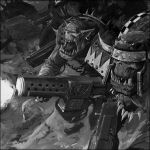
Orks are, essentially, a biological weapon in vaguely humanoid form. They were designed by an ancient race (every sci-fi universe needs an "ancient race") to infest enemy planets and wage endless war against them. They have since developed their own independence and culture. They are loosely organized in "Clans," but only in the broadest sense: an Ork Army doesn't necessarily have to claim membership in any clan at all. The clans have some minor defining characteristics, but they're not really worth mentioning. There are no Ork civilians: they all live for war.
Ork biology is actually quite interesting. There are no Ork females, or males for that matter. Orks reproduce by shedding spores: They shed these spores throughout their entire lives, culminating in a final massive burst of spores when they die. The spores settle into dark places, and grow into mushrooms. While the mushrooms appear pretty normal from above ground, below ground there is a pod wherein a creature grows. Every Ork spore contains enough genetic information to make not only an Ork, but any member of the "Greenskin" ecosystem: dog-like beasts called squigs, tiny goblins called Snotlings, bigger goblins called Gretchin, full Orks and even massive dinosaur-like creatures called Squiggoths.
Every Ork is born with a ton of genetically-implanted memories: they are born fully grown, knowing how to talk, knowing how to operate simple vehicles and weapons, and having a basic understanding of Ork society (which boils down to "The biggest guy is in charge.") Some rare Orks are born with more knowledge: "Meks" are born with a very extensive understanding of science and technology, and "Doks" are born with a vast array of medical expertise. This understanding is all instinctual rather than intellectual: they are capable of doing things, but generally don't fully understand what they're doing as they do it. They can't explain it to anyone else. On the podcast, quite a while ago, someone asked how Orks can possibly build and pilot space ships. This is how. They also have an in-built psychic element: Orks can force things to happen through sheer willpower. Some of their weapons and vehicles are so crude that they should, by all logic, break down constantly. They maintain function largely because the Orks using them want and expect them to keep working. This power is not infinite, however: they can't make a toy gun shoot real bullets or anything crazy like that.
Choas Space Marines!
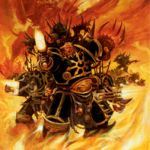
Chaos Space Marines are SM who have turned from the Emperor, the god and leader of the Imperium, and instead swear fealty to the Chaos Gods, a group of four entities that exist in the warp. It's worth mentioning that the term "God" is not used lightly in either of these cases: The Emperor is so psychically powerful that he actually can intervene anywhere in the Imperium, and the Chaos Gods are even more powerful than that. In both cases, the intervention of the god is much easier and more effective if it is expressed through someone with a deep connection to the god, so "Priests" serve a very real role.
The Chaos Gods live in a dimension called "The Warp," which fulfills the roles of both Hyperspace and Hell. It is a realm that is heavily influenced by the thoughts of mortals: every thought creates a ripple, and enough of these ripples can coalesce into conscious beings called "Daemons." The four biggest Daemons are the gods. A good video game reference would be Dragon Age's "Fade," which has a similar mechanic of creating beings based on our thoughts. The Warp is also the source of psychic power, and has the effect of mutating people directly exposed to it: think Lovecraft, with extra tentacles and eyes sprouting out.
There aren't very many "new" CSM. Most of them are the original defectors from an event called the "Horus Heresy," named after Horus, the Emperor's second-in-command who became corrupted and led the Imperium into a massive civil war. Most CSM live in the Warp, and because of how the warp effects the passage of time, most of them aren't even very much older than an average "modern" space marine in the biological sense. The individual Chaos legions have some defining characteristics, but it's more effective to go straight to the gods. The four Chaos gods are:
Khorne, God of War, Bloodlust and general violence. Khornate daemons are based on the common kind of demon: red skin, horns, etc.
Nurgle, God of Disease, Pestilence and Despair. Nurgle daemons looks like zombies.
Tzeentch (pronounced as a single syllable,) God of Change, Evolution, fate and Magic. Tzeentch daemons are amorphous and shifting.
Slaanesh, god of Sex, Drugs and Rock & Roll. Okay, not really, he's the god of Excess and the relentless pursuit of pleasure at all costs. Also hermaphrodites. His daemons are based on corrupted versions of beauty.
Aside from the Daemons, there isn't much to say about CSM for an obvious reason: They're still basically Space Marines. If you understand SM and you understand Daemons, there isn't much left to learn about CSM. This is probably the reason that CSM are the "other side" in the upcoming game's multiplayer: there's a natural parity, a natural equality that doesn't exist in an SM vs Orks conflict.
The Tabletop Game
Models come in parts, generally some torsos, some arms, some legs and some heads. This is primarily to allow for some customization. Very long ago, all models were metal. Less long ago, many models were plastic, and only the big important ones were metal. Nowadays, the last of the metal models are being slowly phased out in favor of resin models. Generally, plastic is better than metal: it's easier to work with, it holds glue better, it's lighter to transport, and it's less likely to break if dropped because of the lighter weight. Some people see merit in metal models, but most (including me) don't.
Painting the models is a bit easier than you might think. With a fine-tipped brush, it's surprisingly easy to add detailed flourishes. Most tournaments and formal games have painting requirements: the most common is the "three-color rule," which (obviously) requires that the model display at least three distinct colors. This rule is very common because it's easy to enforce, and it doesn't require arbitrary decisions about the quality of someone's painting work.
The actual tabletop game takes place on a table, obviously. The starting size for tables is four feet by four feet, and they get bigger from there. On the table is modeled "terrain," which allows units to take cover and hide. Playing without any terrain is possible, but it's a bit boring, and sometimes unbalanced because the game and some factions are designed with the assumption that there will be some.
The mechanism to ensure that both armies are roughly equal is "points." Everything you could possibly put in your army, every model, every tank, every gun, every special power or skill, it all costs points. Both players agree beforehand on the "Points Limit" of the game. For example, a Space Marine Captain to lead your army costs 100 points. He has a large array of weapons options: a power weapon costs 15 points, while a thunder hammer costs 30. The common points values are 1750, 1850 and 2000. European tournies tend towards the lower values, while Americans tend towards the larger. Bigger forces mean longer games with more varied units, while smaller forces mean shorter games and force tougher decisions about what to bring and what not to bring. Sometimes people play "what the fuck" games where multiple players pitch in to create massive 10,000 vs 10,000 point conflicts, but these are generally regarded as stupid-fun and not tactically interesting.
Each game consists of each player taking turns. Each turn consists of three phases: Movement, Shooting and Assault in that order. (Though, there are rumors that the next edition of the core rules will change the order and introduce a new phase or two.) Every unit can move on every turn unless something bad happened to them. Some units cannot shoot if they moved a certain distance during the movement phase, but otherwise all of them can generally shoot. Guns have a set range (12 inches for a pistol, 24 for most rifes, 48 for most heavy weapons. The Tau Railgun has a range of 72, while some of the Imperial Guard's artillery guns have an obnoxious range of 240 inches, which is effectively "unlimited" for all but the craziest of games.) They also have strength and armour-penetration values, which factor into the die rolls to determine damage. Games Workshop is British, so you are obligated to spell it "Armour." The game doesn't require any math beyond some very basic addition, and nobody carries a calculator.
I should note that there are no boats, and battlefields rarely contain any water except the occasional river-through-the-middle. Aircraft is rare for a number of reasons, both gameplay and modeling, but it's becoming more and more common. Space ships are only represented in an abstract sense: some factions have the ability to command an Orbital Bombardment, but there's no model for it. It's just an attack.
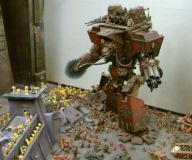
It should probably also mention Titans. Titans are massive fighting robots. Titans exist in the lore, but very rarely appear in games, simply because they are an overpowering presence that dominates everything else so completely, and cost a moderately-sized fortune in both points and real money. The smallest of Titans is easily the biggest model on the battlefield, while the larger Titans would be so large that they would be better represented by a small child in cosplay than an actual model. The image on the left is one of the larger Titans.
"Entry Points"
The podcast raised the notion of an "Entry Point" into the universe. I'll tackle this notion from two angles, the Tabletop game and the Literature.
It's hard to recommend to someone that they get into the tabletop game over the internet. Unless you're interested in the models from a purely artistic perspective (a path with some merit: there are painting competitions,) the game is pretty meaningless without some real people to play against. For full disclosure, I should say that I haven't actually played the tabletop game for quite a while, though I do keep up with "the scene," so to speak. If you're really interested, try to find a hobby store in your area and see if you like the atmosphere. Try to make friends with some of the people there. The age range is pretty similar to that of video games: there are 13-year-olds who's parents see it as a good hobby, and 40-year-olds who have been playing since they were kids and now have kids of their own. There are local tournaments and international tournaments, with varying rulesets. It's all very interesting, but again, you really need to speak to some people in person in order to get into it, it's not something you can do in a vacuum.
The literature is something I can talk about with a bit more confidence, since it doesn't require you to talk to real people to get into. Before I make actual recommendations, there are a few things to mention. First of all, as you probably already expect, a lot of it is pretty trashy. Literature, like video games, often falls down to a certain "baseline": Like generic third-person action games, most 40k books are basically enjoyable but also totally forgettable and not really worth the time. I like to think I've read enough to steer you towards some of the genuinely good ones.
Secondly, the Black Library online store is very poorly designed. For starters, the e-book, audio book and physical book versions of each novel are treated as entirely separate entities. Adding to this travesty is the fact that books in the same series aren't linked together in any meaningful way. It's really a bad experience. For this reason, you should probably use Amazon, with one possible exception: once you actually do manage to purchase an e-book, they're quite modern about it. You have your choice of formats, you can re-download all you like, and it's DRM-free. If that matters to you, use the Black Library site. Otherwise, use Amazon. Now, onto actual recommendations.
If I had written this a few years ago, I would have found it very hard to recommend any Space Marine books. The most popular and longest-running series is the "Space Wolf" saga, which follows the exploits of a character named Ragnar Blackmane. I admit I haven't read much of it, since I tend to shy away from Space Marine books: writers often find it easy to become too infatuated with combat, and with the bombastic over-the-topness of Space Marines, leaving little time for things like character development. Still, the series has run long enough that it must have some merit.
The Space Marine books that I actually can recommend are those of the more recent "Horus Heresy" series. The series covers many books from many authors, and I haven't read all of them, but they all work to flesh out this early period of the Imperium's history and have a particular focus on giving actual characterization and personality to characters who have been a part of the lore for decades. It also helps that, in this period of time, the Imperium's "official religion" is actually atheism. The Emperor's apotheosis hasn't happened yet, so the Space Marines are much more of a realistic military force without so much zealotry. The first three books should be read first, in order. After that, the chronology isn't very important: if there's a particular SM chapter that interests you, jump to that chapter's book(s).
http://en.wikipedia.org/wiki/Horus_Heresy_(novels)
The Imperial Guard is the Imperium's basic military force: it consists of ordinary men and women with guns. No genetic enhancements or power armor to be found, just guns and tanks. Imperial Guard books therefore tend to be a bit more down-to-earth, with believable characters and more human motivations. The Gaunt's Ghosts series is a very long running and very good series that follows a specific regiment of the guard from their original, very troubled formation to their present conflicts. The regiment itself is focused on special operations and recon, which means the books deal less with meat-grinder mega-wars and more with black-ops missions. The core characters are likable and real-feeling, and a great deal of time is spent on their basic interactions with eachother off of the battlefield. The main character, Gaunt, takes control of a regiment (Tanith's First) and basically orders them to flee their homeworld as it is being destroyed. As a result of not being allowed to stay and defend their homes, most of the regiment hates his guts for the beginning of the series, but over time a real and appreciable loyalty develops. I'm quite fond of the whole thing.
http://en.wikipedia.org/wiki/Gaunt%27s_Ghosts
The other pretty long Imperial Guard series I've read and recommend is the sage of Ciaphus Cain. The Cain novels are unique in the 40k universe for being a bit less serious. They aren't really a parody or anything like that: they never make fun of the 40k universe itself. Instead, the character himself is a man who constantly finds himself in dangerous situations and, motivated entirely by self-preservation and a desire to survive, somehow comes out looking like a hero. It's difficult to explain exactly how, but the books can be quite funny at times, though it's all situational humor with very few "jokes." Cain develops a reputation as a champion of justice, though his internal monologue reveals that nearly every decision he makes is based on a short-sighted desire for immediate security and self-preservation. He's a fundamentally selfish person, but also quite likable.
http://en.wikipedia.org/wiki/Ciaphas_Cain
The other part of the Imperium worth exploring is the Inquisition. The Inquisition is a group of people within the Imperium, called Inquisitors, who are a combination of soldier and detective. They have essentially unlimited power: they can commandeer imperial ships, order around Imperial Guard generals, and even traffic with aliens and daemons on occasion. Inquisition books tend to get pretty dark: they explore chaos's corruption of humanity on a more personal level, with individual heretic's schemes rather than broadly-defined armies of traitors. Inquisitors themselves are also powerful characters, expressing more individualism than most military figures. For this reason, GW has struggled to find a place for Inquistors in the tabletop game, but they make good fodder for books. For me, the heart and soul of the Inquisition is the Gregor Eisenhorn series, from the same author as Gaunt's Ghosts. It follows the titular Inquisitor as his power grows, his friends join him (and often die,) and as his philosophy changes. By the end of the series he's a profoundly dark figure, and I've re-read the series twice.
http://www.blacklibrary.com/Warhammer-40000/The-Inquisition/Eisenhorn-Omnibus.html<Wikipedia doesn't actually have a good page.
There's also a series that follows Eisenhorn's apprentice, Ravenor, but that's not much of an entry point since it's a sequel series. It's also quite good though. Ravenor is a more hands-off leader, so the books often focus more on his team than himself.
If you're wondering where all of the non-imperium books are, you're quite right that there aren't too many by comparison. For obvious reasons, authors find it harder to explore non-human entities. There are a few Eldar books that I've been meaning to get into, but obviously can't recommend yet. (Eldar = Space Elves, Protoss.) Most of the other factions are easier to use as enemies than protagonists, and therefore don't get much attention.
There is one book that's currently out of print that I've read a couple of times and quite like. It's called "Pawns of Chaos," and it takes place on a world that the Imperium abandoned long ago. The main characters are primitive villagers who worship the Chaos God Tzeentch without really understanding why that's a bad thing. To them, the chaos sorcerers are just holy men, seers and shamans. It also doesn't hurt that "Change and Evolution" are least obviously offensive of the Chaos God's domains. It's offers a somewhat different view of Chaos than the one you get from the imperial books, and I wish it was in print so I could recommend it. Many of the older, less popular Black Library books aren't available in digital form. (All of the new ones are, and most of the old ones that are worth a damn are aswell.)
In retrospect, this primer is not very brief... but I don't really see myself editing it down too heavily, so here it is. I hope someone finds my vent helpful. If not, at least it helped me.
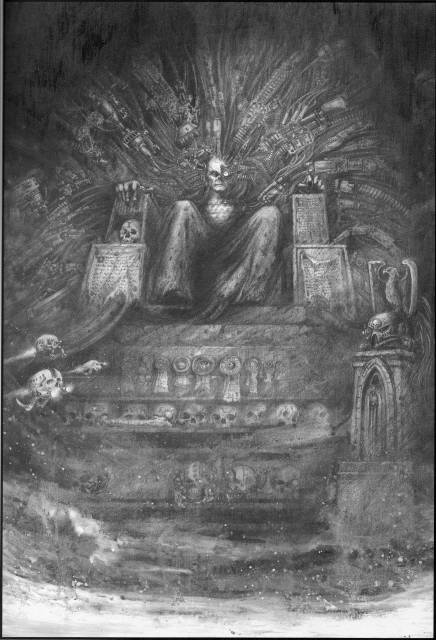
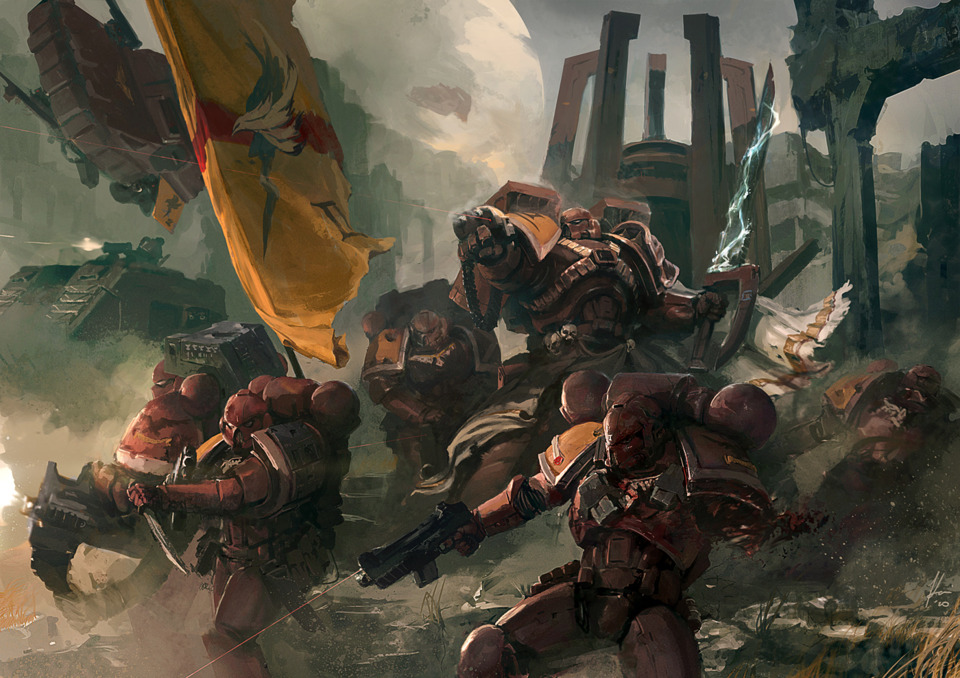
Log in to comment